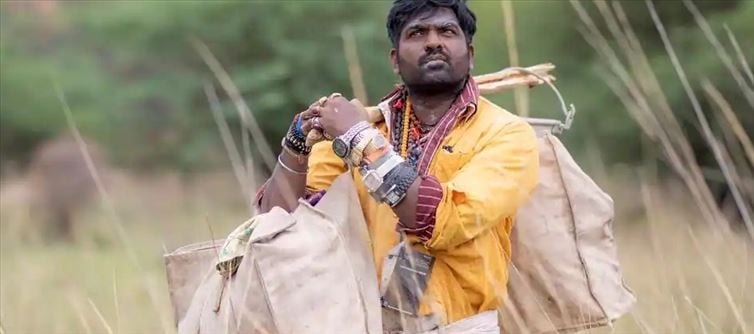Pushpa Telugu Movie Review, Rating
పుష్ప తెలుగు సినిమా రివ్యూ ,రేటింగ్
-
Kenny Bednarek Named Event Ambassador!!
-
10th Tata Steel World 25K: Fierce Competition Among Elite Runners!
-
Fans See Akshaye Beyond On-Screen Persona!!
-
Bhabiji Ghar Par Hain 2.0’ Promo Out!!
-
Meera Bachchan Gives Birth
-
Jaishankar Highlights Decisive Phase
-
Allahabad HC Rejects Arrest Relief Plea
-
Legal Protection for Consenting Couples!?
-
Do You Want Your Image Look Like This? Check This Prompt - AI Just Crossed the Point of No Return
-
Premante OTT Release: Where to Watch, Cast & Plot
-
Shah Rukh Khan Returns to Filming King After Six Week Break
-
No More “Free” Luggage? Railways Warn Passengers
-
Will Prime Video Remove Ads After Legal Hiccup?
-
Dhurandhar: “Beautiful, Simply Beautiful” – Sara Arjun’s Latest Clicks Go Viral
-
Vikram Prabhu on His New Film SIRAI: “Don’t Talk About My Salary I Care About Art!”
-
“Azhagana Kollaiyargal”: Mirunal Thakur’s ‘Tekayt’ Teaser Crosses One Crore Views
-
Tom Cruise Returns to Non-Action Drama After 13 Years, Teams Up with Oscar-Winning Director
-
Chennai Film Festival: Sasikumar Wins Best Actor Award
-
DMK Alliance Announces Massive Protest Against Changes to 100-Day Work Plan
-
Udhayanidhi Launches 125 New Electric Buses, Expanding Poondhamalli Service
-
Udhayanidhi Stalin Says Christian and Dravidian Principles Are Similar
-
DMK Alliance to Protest on December 24 Demanding Reversal of Law That Abolishes the 100-Day Work Scheme
-
The Kandahar Lie That ‘Dhurandhar’ Won’t Tell You - When Propaganda Rewrites History
-
When a Superstar’s Touch Made a Leading Lady Uncomfortable
-
Is Pooja Hegde Already a Problem for Vijay’s ‘Jananayagan’?
-
“One of the Biggest Pleasant Surprises of the Year”: Anaconda Reactions Defy All Expectations
-
Post-Credits or False Hope? Avatar: Fire and Ash Makes a Bold Call
-
Death, Birth, and an Uneasy Truce: Why Fire and Ash Feels Like an Ending and a Beginning
-
How Nidhhi Agerwal Was Left Exposed? The Shocking Truth Behind Nidhhi Agerwal’s Ordeal
-
Pharma Review – A Familiar Exposé That Never Finds Its Pulse
-
BO Projection: What’s Avatar 3’s Collection Trend Likely to Be?
-
Products of Women’s Self-Help Groups Record Sales Worth ₹690 Crore: Deputy Chief Minister Udhayanidhi Stalin Expresses Pride
-
Hit Movies Releasing on OTT Platforms This Week
-
Jason Sanjay, Son of Vijay, Completes Shooting for Sigma; Teaser Release Date Announced
-
Edappadi’s Dream of Scrapping the Laptop Scheme Will Not Come True: Deputy Chief Minister Udhayanidhi Stalin
-
Protest Against the Union Government Over the 100-Day Employment Scheme: Edappadi Palaniswami
-
I Will Campaign for the DMK Alliance in the Assembly Elections: MP Kamal Haasan
-
Let Us Celebrate the Legacy of Professor K. Anbazhagan on His Birth Anniversary: MP Kanimozhi
-
Chief Minister M.K. Stalin Pays Floral Tribute to the Portrait of Professor K. Anbazhagan
-
Ministers to Hold Talks with Government Employees and Teachers’ Union Leaders on December 22
-
Fear in His Eyes, Notes in His Hand, Still Stammering — Politics Has No Retakes Vijay
-
TVK Vijay’s Politics Is Nothing But Lies — Reality Check
-
Arrest First, Explain Later: How Karnataka’s Hate Speech Law Criminalises Opinion
-
“It’s Going to Explode”: Fallout’s Ella Purnell Teases Lucy vs. The Ghoul Showdown
-
Paul Rudd Breaks Silence on Avengers: Doomsday—and Immediately Says...
-
Star Wars: The Force Awakens (2015) Review — A Thrilling New Hope Undermined by Broken Promises
-
Fallout Season 2 Review — A Bigger, Bolder Wasteland Even If Not Every Path Leads Somewhere
-
The Housemaid Review — A Trashy, Throwback Thriller That Almost Gets Away With It
-
Avatar: Fire and Ash Review - A Colossal, Emotionally Charged Sci-fi Epic That Refuses To Play Safe
Empowering 140+ Indians within and abroad with entertainment, infotainment, credible, independent, issue based journalism oriented latest updates on politics, movies.
India Herald Group of Publishers P LIMITED is MediaTech division of prestigious Kotii Group of Technological Ventures R&D P LIMITED, Which is core purposed to be empowering 760+ crore people across 230+ countries of this wonderful world.
India Herald Group of Publishers P LIMITED is New Generation Online Media Group, which brings wealthy knowledge of information from PRINT media and Candid yet Fluid presentation from electronic media together into digital media space for our users.
With the help of dedicated journalists team of about 450+ years experience; India Herald Group of Publishers Private LIMITED is the first and only true digital online publishing media groups to have such a dedicated team. Dream of empowering over 1300 million Indians across the world to stay connected with their mother land [from Web, Phone, Tablet and other Smart devices] multiplies India Herald Group of Publishers Private LIMITED team energy to bring the best into all our media initiatives such as https://www.indiaherald.com






















